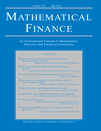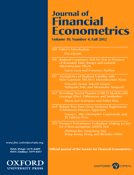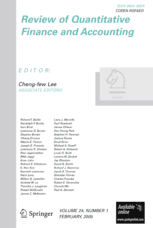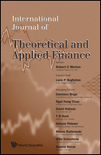
Annals of Finance
Scope & Guideline
Advancing Financial Knowledge Through Rigorous Research
Introduction
Aims and Scopes
- Financial Derivatives and Risk Management:
The journal frequently publishes studies on financial derivatives, including options and futures, focusing on pricing models, risk management strategies, and the implications of market conditions. - Behavioral Finance and Investor Psychology:
Research in this area examines how psychological factors influence investor behavior and market dynamics, providing insights into anomalies and decision-making processes. - Microfinance and Banking Dynamics:
There is a consistent focus on microfinance mechanisms, banking behavior, and the impact of financial regulations on banking systems, particularly in emerging economies. - Asset Pricing and Portfolio Optimization:
The journal includes a wide range of studies on asset pricing models, portfolio selection strategies, and optimization techniques, emphasizing both theoretical and empirical analyses. - Macroeconomic Influences on Finance:
Papers often explore the interaction between macroeconomic factors and financial markets, including interest rates, economic cycles, and systemic risks. - Emerging Financial Technologies:
The journal showcases innovative research on the application of technology in finance, including algorithmic trading, blockchain, and the impact of artificial intelligence on financial decision-making.
Trending and Emerging
- Integration of Machine Learning in Finance:
There is a growing trend of utilizing machine learning and artificial intelligence in financial modeling, particularly in areas such as option pricing and risk assessment, showcasing the intersection of technology and finance. - Impact of Social Factors on Financial Decisions:
Research exploring how social media and public sentiment influence financial decision-making and market behavior is on the rise, indicating an increased interest in the sociopsychological aspects of finance. - Sustainability and Ethical Finance:
Emerging studies focus on the implications of sustainability, ethical investing, and the role of finance in addressing global challenges, reflecting a broader societal shift towards responsible investment practices. - Dynamic and Adaptive Risk Models:
The journal is increasingly publishing research on dynamic risk models that account for volatility and uncertainty, moving away from static approaches to risk management. - Global Financial Stability and Regulation:
There is an uptick in research examining the implications of regulatory frameworks on global financial stability, particularly in response to recent financial crises and evolving market conditions.
Declining or Waning
- Traditional Banking Models:
Research centered on conventional banking practices and models has been less prevalent, possibly due to the rise of fintech and alternative financial services that challenge traditional paradigms. - Static Risk Assessment Models:
Studies that rely on static or traditional risk assessment models are becoming less common, as the field shifts towards more dynamic and adaptive approaches to risk management. - Descriptive Economic Analysis:
There has been a noticeable decrease in purely descriptive studies that do not incorporate quantitative analysis or advanced modeling techniques, as the journal increasingly favors rigorous empirical research. - Single-Country Studies:
Papers focusing exclusively on single-country analyses are appearing less frequently, reflecting a growing trend towards comparative studies and international perspectives. - Historical Financial Trends:
Research that primarily examines historical trends without linking them to contemporary issues or predictive analytics is declining, as the journal emphasizes relevance to current financial challenges.
Similar Journals

MATHEMATICAL FINANCE
Elevating Standards in Financial AcademiaMATHEMATICAL FINANCE is a prestigious journal published by Wiley, focusing on the interdisciplinary fields of finance, applied mathematics, accounting, and economics. With its ISSN 0960-1627 and E-ISSN 1467-9965, this journal has earned its place in the top tier of academic publications, reflected by its Q1 rankings across multiple categories in 2023, including Accounting, Applied Mathematics, Economics and Econometrics, Finance, and Social Sciences. MATHEMATICAL FINANCE, which commenced publishing in 1991, is recognized for its rigorous peer-review process and its significant contribution to the advancement of knowledge in quantitative finance methodologies and risk management practices. Although it does not currently offer open access, the journal remains an invaluable resource for researchers, professionals, and students seeking to stay abreast of the latest theoretical advancements and empirical studies in mathematical finance. Its impact factor and Scopus rankings further illustrate its high standing within the academic community, making it an essential platform for impactful research and scholarly discourse.

Journal of Financial Econometrics
Bridging theory and practice in financial econometrics.Journal of Financial Econometrics, published by Oxford University Press, stands as a leading academic journal in the fields of financial economics and econometrics. With an impressive impact factor and a ranking in the Q1 quartile for both Economics and Finance categories in 2023, this journal is recognized for its contribution to advancing theoretical and applied methodologies in financial econometric analysis. It publishes high-quality research that addresses critical issues in finance, aiming to foster a deeper understanding of the economic factors influencing financial markets and instruments. Researchers and practitioners alike benefit from its rigorous peer-reviewed articles, which are invaluable resources for both academic scholars and finance professionals. The journal’s content typically spans pioneering techniques in econometric modeling, empirical analysis of financial instruments, and innovative applications of econometric theory in real-world scenarios. Operating out of the United Kingdom, the journal continues to serve as a vital platform for disseminating significant research findings from 2005 to 2024, ensuring that the latest advancements in the field are accessible to its audience.

Journal of Investment Management
Exploring the Frontiers of Investment Strategies and Risk Management.The Journal of Investment Management, with ISSN 1545-9144 and E-ISSN 1545-9152, is a prominent platform dedicated to the dissemination of cutting-edge research in the field of investment management. Published by JOURNAL INVESTMENT MANAGEMENT, this journal aims to bridge the gap between theoretical foundations and practical applications, catering to the needs of researchers, professionals, and students alike. With a focus on contemporary issues influencing investment strategies, asset allocation, risk management, and financial innovation, this journal provides valuable insights and methodologies to enhance investment decision-making processes. While currently not operating under an open-access model, the journal is accessible through various academic databases, ensuring that its critical findings reach a wide audience across the globe. Emphasizing the significance of empirical research and analytical rigor, the Journal of Investment Management plays a crucial role in shaping the future of investment practices and academic discourse in this dynamic field.

International Review of Finance
Exploring the forefront of finance and economics.International Review of Finance is a prestigious academic journal published by Wiley, located in the United Kingdom. With its ISSN 1369-412X and E-ISSN 1468-2443, this journal serves as an essential platform for researchers and practitioners in the fields of Economics and Finance. Ranked in the Q2 quartile for both Economics and Econometrics and Finance as of 2023, it showcases high-quality research that contributes significantly to theoretical and practical advancements. Reflecting its standing, the journal is positioned in the 61st percentile in Economics and Econometrics and the 60th percentile in Finance according to Scopus rankings. The scope of the journal includes a diverse range of topics, encouraging innovative discourse across various financial disciplines. Although it does not offer open access, the International Review of Finance continues to be an important resource for academics, professionals, and students seeking to deepen their understanding of evolving financial theories and practices.

Review of Quantitative Finance and Accounting
Empowering Research with Quantitative PrecisionThe Review of Quantitative Finance and Accounting, published by Springer, is a distinguished academic journal that has been at the forefront of scholarly discourse since its inception in 1991. With an ISSN of 0924-865X and an E-ISSN of 1573-7179, this journal specializes in the interdisciplinary realms of accounting and finance, particularly emphasizing quantitative methodologies and their applications in real-world scenarios. With an impressive track record reflected in its 2023 rankings, it sits in the Q2 category across key fields such as Accounting, Business Management, and Finance, demonstrating its relevance and influence within these domains. Although it operates without an Open Access option, the journal's content remains vital for researchers, professionals, and students aiming to deepen their understanding of quantitative approaches in finance and accounting contexts. The Review of Quantitative Finance and Accounting stands as an essential resource for advancing knowledge and fostering innovation within these critical disciplines.

Journal of Risk
Charting New Territories in Risk AnalysisJournal of Risk, published by INCISIVE MEDIA, serves as an essential platform for scholars and practitioners in the fields of finance and strategic management. With an ISSN of 1465-1211 and an E-ISSN of 1755-2842, this journal explores the multifaceted nature of risk, encompassing theoretical frameworks, empirical investigations, and practical applications. Although currently classified in Q4 for both Finance and Strategy and Management categories as per 2023 standards, it provides a crucial forum for innovative research and thought leadership, addressing the challenges faced in understanding and managing risk in today’s dynamic environment. The journal, based in the United States, is committed to advancing knowledge and offering a platform for debate and dialogue in its convergence years from 2011 to 2024. Researchers, professionals, and students are encouraged to contribute their insights to enhance the academic discourse surrounding risk management.

Annals of Financial Economics
Pioneering Research for a Dynamic Financial FutureAnnals of Financial Economics, published by World Scientific Publishing Co. Pte Ltd, is a premier scholarly journal catering to the fields of finance, economics, and international management. With an impressive impact factor and categorized in the Q2 quartile across multiple disciplines in the 2023 rankings, the journal holds a prominent position among its peers, evidenced by its ranking in the top 15% for Economics and Econometrics and Finance categories. The journal aims to foster high-quality, innovative research that addresses contemporary financial issues, making it a vital resource for researchers, professionals, and students alike. Although it does not operate under an open access model, it ensures that its contributions advance scientific discourse and provide valuable insights into financial theories, practices, and policies. With a historical publication span from 2005 to 2009 and again from 2011 to 2024, the Annals remains a critical platform for disseminating transformative ideas in financial economics, ensuring its relevance in a rapidly evolving scholarly landscape.

International Journal of Theoretical and Applied Finance
Connecting theory to practice for impactful financial solutions.International Journal of Theoretical and Applied Finance is a distinguished publication in the field of finance, serving as a critical platform for the dissemination of innovative research and theoretical insights since its inception in 2003. Published by World Scientific Publishing Co Pte Ltd in Singapore, this journal boasts an impressive Q2 ranking in the realms of Economics, Econometrics, and Finance (miscellaneous) and a solid Q3 status in Finance for 2023. With a commitment to advancing knowledge in the complex world of theoretical frameworks and applied financial practices, it welcomes original research articles, comprehensive reviews, and case studies that explore varied facets of finance. Researchers, professionals, and students benefit from the journal's rigorous peer-review process and an ever-expanding repository of knowledge, making it an indispensable resource in the financial academic community. The journal does not currently offer open access, reflecting its selective approach to publishing high-quality content aimed at a specialized audience.

Critical Finance Review
Transforming finance through critical analysis and innovative thought.Critical Finance Review is a premier academic journal dedicated to advancing the field of finance through the publication of high-quality research that spans various dimensions of the discipline. Published by NOW PUBLISHERS INC, this journal has quickly established itself as a leading source of innovative finance scholarship, achieving a notable Q1 classification in the 2023 finance category. Operating under a rigorous peer-review process, the journal ensures the academic integrity and relevance of its content, which attracts contributions from both emerging and established scholars. With an ISSN of 2164-5744 and E-ISSN 2164-5760, it is accessible to a global audience, though it operates under traditional access models. The journal welcomes a diverse range of topics including, but not limited to, risk management, financial markets, and quantitative finance, making it an essential resource for researchers, professionals, and students who are keen to explore the complexities of financial systems and develop new insights in the ever-evolving landscape of finance. Based in the United States, Critical Finance Review holds a significant position within the academic community, fostering a collaborative environment that encourages innovative thinking and practical applications of financial theories.

Annual Review of Financial Economics
Exploring the Dynamics of Economics and FinanceAnnual Review of Financial Economics, published by Annual Reviews, stands as a pivotal journal in the fields of Economics and Finance, recognized for its rigorous analysis and comprehensive reviews since its inception in 2010. With an impressive impact factor reflected in its Q1 ranking in both Economics and Econometrics and Finance for 2023, this journal serves as an essential resource for researchers, professionals, and students keen on understanding the dynamic interplay of financial theories and practices. The ISSN 1941-1367 and E-ISSN 1941-1375 signal its commitment to accessibility and dissemination of cutting-edge research within the community. Addressing crucial topics from market behavior to economic modeling, each annual volume synthesizes the latest findings and theoretical advancements, thus contributing significantly to the global discourse within financial economics. With its high Scopus rankings, including a finance rank of #75 out of 317, the journal continues to foster a deep understanding of financial systems and their implications, serving as an invaluable tool for anyone engaged in the broader economic landscape.